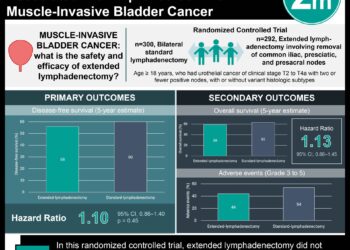Impact of dialysis on survival and home time among older adults with chronic kidney failure
1. In this retrospective cohort study of older adults with kidney failure not referred for transplant, there was no statistically significant difference in survival between those who received early dialysis versus continued medical management.
2. Specifically among those with advanced age or greater disease severity, dialysis was associated with improved survival but less time spent at home.
Evidence Rating Level: 2 (Good)
Study Rundown: Patients who develop kidney failure at an older age but have comorbidities preventing a transplant face the difficult decision of either initiating dialysis or continuing medical management. Considering the potential harms of an intensive therapy such as dialysis, there is a relative scarcity of literature available to guide the shared decision-making process. Prior studies that have documented the survival benefit of dialysis have generally not examined quality of life metrics after beginning therapy. This study was designed to evaluate the effects of starting dialysis on both survival and home time amongst older adults with chronic kidney failure. Overall, it was found that there was no statistically significant difference in survival between those who received dialysis as compared to those who continued medical management. While certain subgroups of patients who were older and sicker had modest gains in survival after beginning dialysis, those additional days were more often spent in health care settings rather than at home. The study was limited by an absence of clinical factors such as the presence or severity of symptoms that may have resulted in an underestimation of dialysis benefit. Further, the study population included primarily men who received hemodialysis, limiting generalizability to other populations and dialysis modalities. Nonetheless, this study shed light on the clinical considerations influencing the decision either start dialysis or continue medical management.
Click to read the study in AIM
Relevant Reading: Dialysis benefits in chronic kidney failure come with trade-offs
In-Depth [retrospective cohort]: This retrospective cohort study was designed to emulate a randomized trial comparing dialysis versus medical management in older patients with chronic kidney failure. Patients were considered eligible if they were 65 years or older and had an estimated glomerular filtration rate (eGFR) below 12 mL/min/1.73 m2 as well as a previous eGFR less than 30/mL/min/1.73 m2 measured between 3 months and 2 years prior to the index eGFR. The eGFR threshold was selected based on the results of a previous study and the IDEAL (Initiating Dialysis Early or Late) trial. A total of 20,440 participants (mean age 77.9 years [SD, 8.8]) were enrolled. In the intention-to-treat analysis, starting dialysis when eGFR fell below 12 mL/min/1.73 m2 was not associated with a difference in mortality compared to those who did not start dialysis (hazard ratio, 0.99 [95% CI, 0.91 to 1.08]). In the per protocol analysis, however, starting dialysis at this point resulted in a gain in survival of 77.6 days (CI, 62.8 to 91.1 days) but 14.7 fewer days spent at home (CI, 11.2 to 16.5 days). Survival benefits were also observed in select subgroups after stratification by age, eGFR, BUN, and hospitalization status. Patients over the age of 80 years generally had improved longevity with dialysis, especially those with lower eGFRs and higher BUNs who were not in the hospital. Overall, this study characterized some of the clinical outcomes affecting the trade-off between dialysis and medical management in older adults with chronic kidney failure.
Image: PD
©2024 2 Minute Medicine, Inc. All rights reserved. No works may be reproduced without expressed written consent from 2 Minute Medicine, Inc. Inquire about licensing here. No article should be construed as medical advice and is not intended as such by the authors or by 2 Minute Medicine, Inc.







